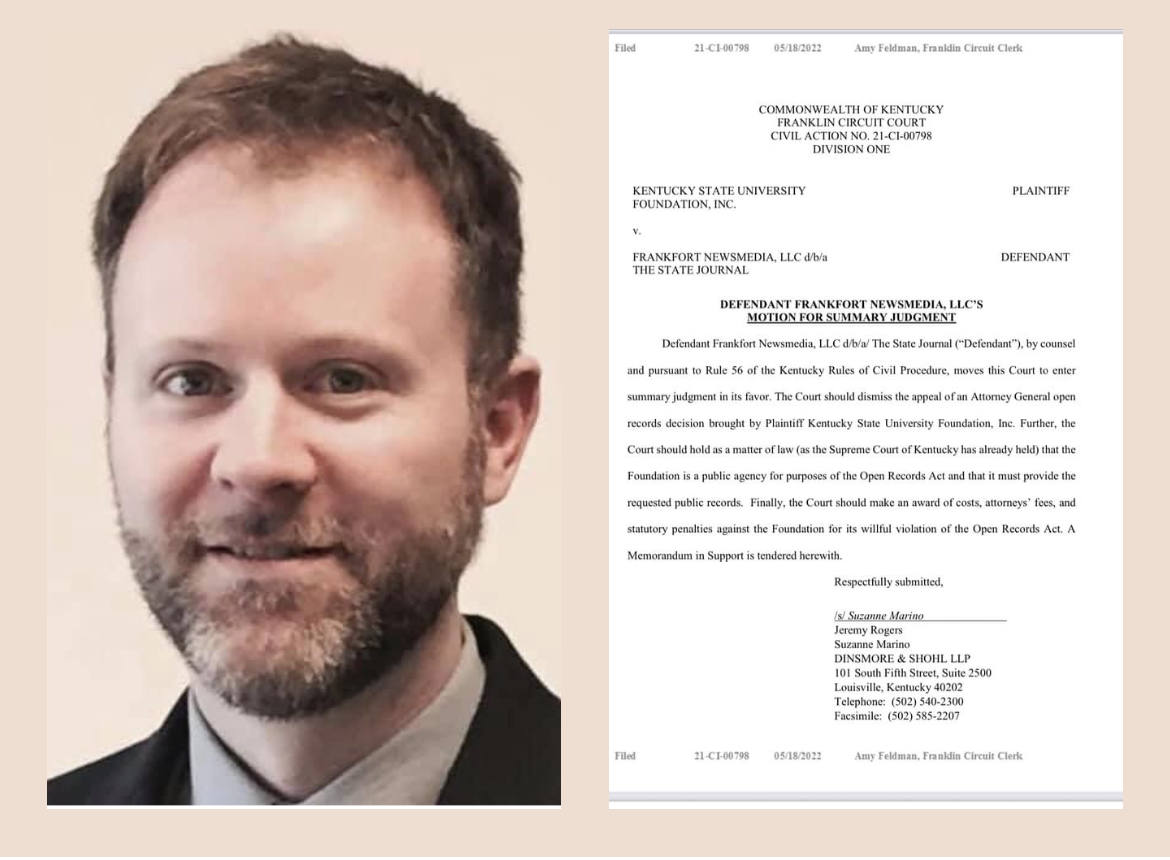
As Kentucky State University rounds the corner to what all hope is a brighter and more accountable future, one major problem remains.
That problem is a lingering resistance to transparency.
Take, for example, it’s ongoing efforts to “secret away” public records. This includes, but is not limited to, re-litigating the status of its foundation under the Kentucky Open Records Act.
https://www.facebook.com/kyopengovernment/photos/a.431755947371133/1019…
Last week, Lexington Herald-leader staff writer Aaron Mudd reported on the state’s salary database found at transparency.ky.gov
https://amp.kentucky.com/news/state/kentucky/article261519512.html
Salaries that appear in the database, Mudd noted, include employees of the executive, judicial, and legislative branch agencies, “along with employees at post-secondary education institutions.”
Having unsuccessfully attempted to locate KSU employee and administrator salaries in the state database in the past, I tried again on Thursday evening. No hits. No apparent participation. I located salary information for colleagues at Western, Murray, Morehead, Eastern, UK, and UofL, but nothing for current KSU officials/staff.
Easy enough to fix, right? So why not fix it?
Much more menacing, however, is the KSU Foundation’s insistence that it is not a public agency for open records purposes and therefore not obligated to open its records for public inspection.
This, in spite of the fact that the Kentucky Supreme Court in 1992 unequivocally ruled that “[a]n interpretation of KRS 61.870(1), which does not include the Foundation as a public agency, is clearly inconsistent with the natural and harmonious reading of KRS 61.870 considering the overall purpose of the Kentucky Open Records law.”
https://casetext.com/case/frankfort-pub-v-kentucky-st-un-found
The Court was referring to the KSU Foundation — not just to any university foundation. Its opponent in that case was The State Journal.
The 1992 opinion — declaring that the KSU Foundation is a public agency for open records purposes — was later reaffirmed by Court of Appeals and the Supreme Court in cases recognizing the status of the University of Louisville Foundation as a public agency for open records purposes.
Univ. of Louisville Found., Inc. v. Cape Publs., Inc., No. 2002-CA-001590-MR, 2003 Ky. App.
Unpub. LEXIS 1370, *22 (Ky. App. 2003).
Cape Pub'ns, Inc. v. Univ. of Louisville Found., Inc., 260 S.W.3d 818, 822-23 (Ky. 2008).
Nevertheless, on October 23, 2021, the Foundation sued the State Journal in Franklin Circuit Court, challenging a September 23 attorney general’s decision reaffirming the 1992 Kentucky Supreme Court opinion determining that the KSU Foundation is a public agency subject to the open records law.
https://www.state-journal.com/education/ksu-foundation-takes-sj-to-cour…
The Foundation had earlier denied the State Journal’s request for records relating to payments made to former President M. Christopher Brown II — for travel and birthday parties — in the two years prior to his hasty departure.
On May 18, The State Journal filed a motion for summary judgment in an effort to bring a swift conclusion to the new — or should we say “renewed” — legal challenge to past and present appellate court and attorney general authority determining that the KSU Foundation is a public agency and accountable to the public through its public records.
Attorneys for the newspaper — Kentucky Open Government Coalition co-director and First Amendment advocate, Jeremy Rogers, and his associate in the law firm of Dinsmore & Shohl, Suzanne Marino — assert:
“The Foundation has gone to great lengths in an attempt to subvert the Supreme Court’s decision and somehow re-invent itself in a way to avoid the public accountability that comes with being a public agency and with administering a state university’s funds. But this attempt must fail.”
In addition to arguments based on res judicata and collateral estoppel — legal doctrines that “preclude repetitious actions,” or stated more simply, “do-overs,” they argue that as “the University’s fiduciary, holding and administering the University’s funds for the University’s exclusive benefit,” the KSU Foundation and KSU “act as one.”
As evidence of this identity of purpose supporting reaffirmation of the Foundation’s status as a public agency, The State Journal underscores:
• KSU’s most recently available annual financial statement (for year ending June 30, 2020) which recognizes that the Foundation is a “component unit” of the University;
• the Foundation’s public facing website which states that its purpose is “to raise and secure funding from any and all sources to support the educational and research efforts of Kentucky State University;”
• a March 11, 2019, Memorandum of Understanding entered into by KSU and the Foundation in order “to advance the mission of Kentucky State University;”
• the University’s web page which explicitly asks donations to be made payable to the Foundation but mailed to the University;
• the Foundation’s procedures for the disbursement of funds; and
• the role of KSU’s president viz the Foundation and the role of the Foundation executive secretary viz the University.
The overwhelming weight of law and fact militate in favor of a holding that the KSU Foundation was, and is, a public agency as defined in the Open Records Act.
But why the need for continuing evasion by non-participation in transparency.ky.gov ?
And, likely more important, why the need to secret away public records of a troubled university in a foundation whose status under the open records law is doubted only by the foundation itself?



